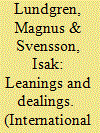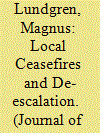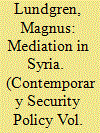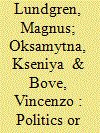|
|
|
Sort Order |
|
|
|
Items / Page
|
|
|
|
|
|
|
| Srl | Item |
| 1 |
ID:
160536


|
|
|
|
|
| Summary/Abstract |
I advance and test a theoretical argument of how participation in UN peacekeeping affects the likelihood of coup attempts in troop-contributing countries (TCCs). The argument highlights the interplay between the economic incentives of militaries in poor TCCs and the UN’s preference for contributors with stable civil–military relations. Fearing the loss of UN reimbursement funds, militaries for which such funds are important will avoid visible acts of military insubordination, such as coup attempts, that would place their future participation in UN peacekeeping at risk. I test this proposition against time-series cross-sectional data on 157 countries in the 1991–2013 period using panel regression and matching. The data show that countries where the armed forces are more dependent on peacekeeping revenues experience fewer coup attempts than comparable peers, even when taking coup-proofing measures and other alternative explanations into account. I also find that the coup-restraining effect is only observed in periods where member states contribute enough troops to award the UN a real choice over alternative contributors. The study introduces a novel theoretic logic, presents empirical results at odds with the existing literature, and suggests important policy implications with regard to UN vetting and standards for troop-contributing countries.
|
|
|
|
|
|
|
|
|
|
|
|
|
|
|
|
| 2 |
ID:
184651


|
|
|
|
|
| Summary/Abstract |
Contemporary peacekeeping operations carry out many disparate tasks, which has triggered a debate about “Christmas Tree mandates.” Did the UN Secretariat or the UN Security Council drive this expansion? Using original data on nineteen UN peacekeeping missions, 1998–2014, this article compares peacekeeping tasks recommended by the Secretariat to those mandated by the Council. It finds that the two bodies expressed different preferences regarding the nature, number, and novelty of peacekeeping tasks. First, the Council dropped Secretariat-recommended tasks as often as it added new ones on its own initiative. Second, the two bodies disagreed more over peacebuilding and peacemaking tasks than over peacekeeping tasks. Third, the Council preferred to be the one to introduce novel tasks that had not appeared in previous mandates. Finally, among the countries that “held the pen” on peacekeeping resolutions, the United States was the most prone to dropping Secretariat-proposed tasks and the least willing to add tasks itself.
|
|
|
|
|
|
|
|
|
|
|
|
|
|
|
|
| 3 |
ID:
186332


|
|
|
|
|
| Summary/Abstract |
Research on UN peacekeeping operations has established that operations' size and composition affect peacekeeping success. However, we lack systematic data for evaluating whether variation in tasks assigned to UN peacekeeping mandates matters and what explains different configurations of mandated tasks in the first place. Drawing on UN Security Council resolutions that establish, extend, or revise mandates of 27 UN peacekeeping operations in Africa in the 1991–2017 period, the Peacekeeping Mandates (PEMA) dataset fills this gap. It records 41 distinct tasks, ranging from disarmament to reconciliation and electoral support. For each task, the PEMA dataset also distinguishes between three modalities of engagement (monitoring, assisting, and securing) and whether the task is requested or merely encouraged. To illustrate the usefulness of our data, we re-examine Hultman, Kathman, and Shannon’s (2013) analysis of operations’ ability to protect civilians. Our results show that host governments and rebel groups respond differently to civilian protection mandates.
|
|
|
|
|
|
|
|
|
|
|
|
|
|
|
|
| 4 |
ID:
133153


|
|
|
|
|
| Publication |
2014.
|
| Summary/Abstract |
Two characteristics of mediators - bias and leverage - are discussed intensively in the research on international mediation. However, whereas bias and leverage have been examined in mediation by states, relatively little is known about their role in mediation by international organizations (ios). This study provides new ways of conceptualizing io bias and leverage and utilizes unique data to measure the impact of io bias and leverage on mediation outcomes. Exploring all cases of civil war mediation by ios in the period 1975-2004, we find that ios where member states provide support to both sides in a conflict outperform ios whose member states remain disinterested. ios with significant trade leverage also increase the likelihood of mediation success. The study demonstrates that ios rarely have a neutral relationship to civil war combatants, that mediation by ios is laden with member state interests, and that such interests shape outcomes.
|
|
|
|
|
|
|
|
|
|
|
|
|
|
|
|
| 5 |
ID:
193113


|
|
|
|
|
| Summary/Abstract |
Local ceasefire agreements are prevalent in modern civil wars, but we know little about their impact. This study analyzes geo-referenced data on 145 local ceasefire agreements declared during the Syrian Civil War, 2011-2019, exploring their short- and long-term effects on the intensity of armed violence. Drawing on scholarship on gradual confidence-building processes, we theorize the conditions under which local ceasefire agreements may generate trust and reduce conflict intensity. Using interrupted time-series analysis and spatial panel regression, we examine factors relating to the design and strategic context of ceasefire agreements. We find that local ceasefire agreements can trigger both escalation and de-escalation in the short term. De-escalatory outcomes are more likely in the long-term, when ceasefire signatories share a history of previous interaction, and when ceasefires are implemented in a stepwise fashion. We also find evidence of spatial diffusion: local ceasefire agreements in one area reduce conflict intensity in neighboring areas.
|
|
|
|
|
|
|
|
|
|
|
|
|
|
|
|
| 6 |
ID:
146814


|
|
|
|
|
| Contents |
This article investigates mediation efforts in Syria from the outbreak of the civil war in 2011 through the spring of 2016. It describes the principal initiatives, analyses differences and similarities across mediators, and identifies strategic obstacles that prevented substantive progress. Focusing on mediation initiatives undertaken by the Arab League and the United Nations, it finds that there is considerable path dependence across efforts and that most of the limited achievements, notably ceasefires in 2012 and 2016, resulted from the application of external leverage. Settlement in Syria was conditioned on overcoming significant commitment problems, aggravated by sectarian mistrust, the fractured nature of the opposition, and international disunity. The article contributes the first review of mediation in Syria that comprehends the conflict in its entirety, systematizes data for research on conflict management, and evaluates existing mediation policy in Syria with an eye to the future.
|
|
|
|
|
|
|
|
|
|
|
|
|
|
|
|
| 7 |
ID:
180192


|
|
|
|
|
| Summary/Abstract |
International organizations’ ability to respond promptly to crises is essential for their effectiveness and legitimacy. For the UN, which sends peacekeeping missions to some of the world’s most difficult conflicts, responsiveness can save lives and protect peace. Very often, however, the UN fails to deploy peacekeepers rapidly. Lacking a standing army, the UN relies on its member states to provide troops for peacekeeping operations. In the first systematic study of the determinants of deployment speed in UN peacekeeping, we theorize that this speed hinges on the incentives, capabilities, and constraints of the troop-contributing countries. Using duration modeling, we analyze novel data on the deployment speed in 28 peacekeeping operations between 1991 and 2015. Our data reveal three principal findings: All else equal, countries that depend on peacekeeping reimbursements by the UN, are exposed to negative externalities from a particular conflict, or lack parliamentary constraints on sending troops abroad deploy more swiftly than others. By underlining how member state characteristics affect aggregate outcomes, these findings have important implications for research on the effectiveness of UN peacekeeping, troop contribution dynamics, and rapid deployment initiatives.
|
|
|
|
|
|
|
|
|
|
|
|
|
|
|
|
| 8 |
ID:
183146


|
|
|
|
|
| Summary/Abstract |
International organizations face a trade-off between the need to replace poorly performing leaders and the imperative of preserving the loyalty of influential or pivotal member states. This performance-politics dilemma is particularly acute in UN peacekeeping. Leaders of peacekeeping operations are responsible for ensuring that peacekeepers implement mandates, maintain discipline, and stay safe. Yet, if leaders fail to do so, is the UN Secretariat able and willing to replace them? We investigate newly collected data on the tenure of 238 civilian and military leaders in thirty-eight peacekeeping operations, 1978 to 2017. We find that the tenures of civilian leaders are insensitive to performance, but that military leaders in poorly performing missions are more likely to be replaced. We also find evidence that political considerations complicate the UN’s efforts at accountability. Holding mission performance constant, military leaders from countries that are powerful or contribute large numbers of troops stay longer in post.
|
|
|
|
|
|
|
|
|
|
|
|
|
|
|
|
|
|
|
|
|